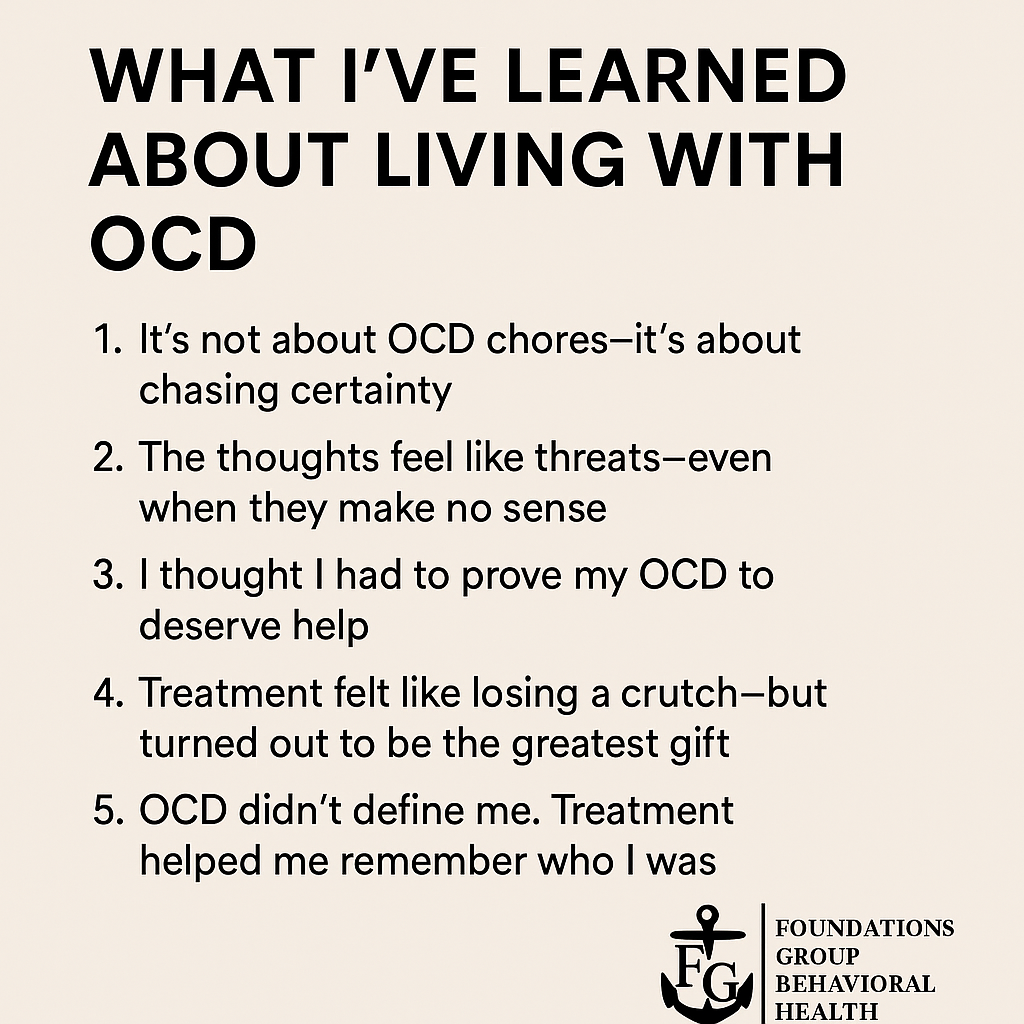There’s a strange moment when the world learns you have OCD: a flood of nods and knowing smiles. “Oh, you like things tidy.” Or “You probably just want things in order, that’s all.” But that simplification cut deeper than any accurate description could have. OCD wasn’t about order. It was about panic. Shame. Living inside of fear—and constant doubt that I could control it.
Here’s what I wish someone had told me earlier: OCD is more than quirky habits. It’s a haunting loop. And for those stuck in it, OCD treatment in Massachusetts can offer a path to real relief. You’ll hear it in my five stories below.
1. It’s not about OCD chores—it’s about chasing certainty
You might see me straighten my stack of books or align the remote control—but it wasn’t about aesthetics. It was about stopping the question looping in my head: “What if I did something wrong?”
I would tap something 12 times because my brain screamed, “If you don’t, your mom could be in danger.” I once rewrote texts repeatedly, fearing I’d accidentally insult someone. The compulsion gave me a sliver of relief—but only enough to chase the anxiety again the next day.
OCD isn’t about control. It’s about surviving anxiety that feels unspeakable otherwise.
2. The thoughts feel like threats—even when they make no sense
I’ve had intrusive thoughts—terrifying, unwanted, violent. Thoughts that I, out of nowhere, would hurt someone. Thoughts that I’d be responsible for something horrible.
Because OCD makes fear sound real.
Not fake. Not “just OCD.” Real.
Even after I reminded myself, “That was just a thought,” it didn’t help. Because fear doesn’t care about facts; it cares about felt safety. And OCD hijacks that feeling with believable certainty.
3. I thought I had to prove my OCD to deserve help
My therapist once asked if I’d been washing my hands until they bled. I said no and suddenly felt like I hadn’t earned the label. I wasn’t “hardcore” enough.
But OCD isn’t about extremes. It’s a spectrum.
Checking locks for half an hour—even tipping the scale of ordinary—can still cost you hours of your day, guilt, or self-trust. And that’s enough to deserve compassion, not skepticism.

4. Treatment felt like losing a crutch—but turned out to be the greatest gift
I was terrified to start ERP (Exposure and Response Prevention). The idea of not doing my rituals felt like letting a storm in. But PTSD taught me that leaning into fear—without clinging to it—is how the brain learns safety again.
Slowly, I realized I didn’t need the ritual to survive. And when the compulsion finally loosened, something surprising happened: I felt free. Lighter. More myself than I had in years.
What terrified me became the path back to living.
5. OCD didn’t define me. Treatment helped me remember who I was.
OCD whispered that I was messy, shameful, broken. And for a long time, I believed it.
Here’s the reality: OCD is a disorder of the brain, not a definition of the person. Underneath that loud inner voice, there’s curiosity, humor, creativity, kindness.
Treatment didn’t erase my quirks—it invited them back. I started drawing again, reconnected with friends, tried new hobbies. Joy returned in small ways—because I finally had space to notice it again.
FAQs: Breaking Through Ambiguity
Q: What exactly is OCD if it’s more than “liking things clean”?
A: OCD is a cycle: intrusive thoughts → anxiety → compulsions to feel safe → temporary relief → repeat. It’s not about neatness—it’s about fear and control.
Q: Are these compulsions obvious or dramatic?
A: Not always. Compulsions can be mental: silent prayers, rehearsing conversations, mental counting. They can be quiet but draining.
Q: Is ERP really the only solution?
A: ERP is the gold standard, but many find success with blended approaches: CBT, mindfulness, medication, and peer support.
Q: I feel guilty even thinking about treatment—will I lose part of myself?
A: Treatment isn’t denting your identity—it’s releasing you from the chains that prevented you from being you. Sobriety isn’t losing who you are. It’s finding out who you’ve been all along.
Q: What if treatment “doesn’t work”?
A: OCD recovery isn’t linear. You may have setbacks. But each attempt builds resilience. With skilled support, most people see progress—even if it feels slow at first.
You’re Not Broken. You’re Brave.
Understanding OCD isn’t about owning a label—it’s about reclaiming your life from a loop you never chose.
If anything in this story resonated—if any of this feels too close to your own experience—you’re not alone, and you deserve help that truly works.
At Foundations Group Behavioral Health in Massachusetts, our OCD treatment program combines ERP, compassionate coaching, medication consultation, and peer support—all in a space where your experience matters.
Call us at (888) 685-9730 or Contact Us.








